 Top 10 Surprising Magnesium Benefits
Top 10 Surprising Magnesium Benefits
Magnesium benefits the body as much, if not more, than any other nutrient you can name. Magnesium is to the human body what oil is to a car. You absolutely need it if you expect to have an efficiently running body! The only difference is, that you need to top your magnesium stores more often than you are getting your oil changed. You should be making sure that you are getting adequate magnesium into your body every day. To highlight its importance, here are the top 10 magnesium benefits for the human body.
Magnesium benefits over 300 different physiological processes and is required for the proper function of almost every cell in the body. At the same time, a vast proportion of our society is deficient. Although a nutrition plan that accounts for a diverse set of nutrients is key for optimal health, if there was one nutrient that could make a drastic impact on your well-being, magnesium may just be it.
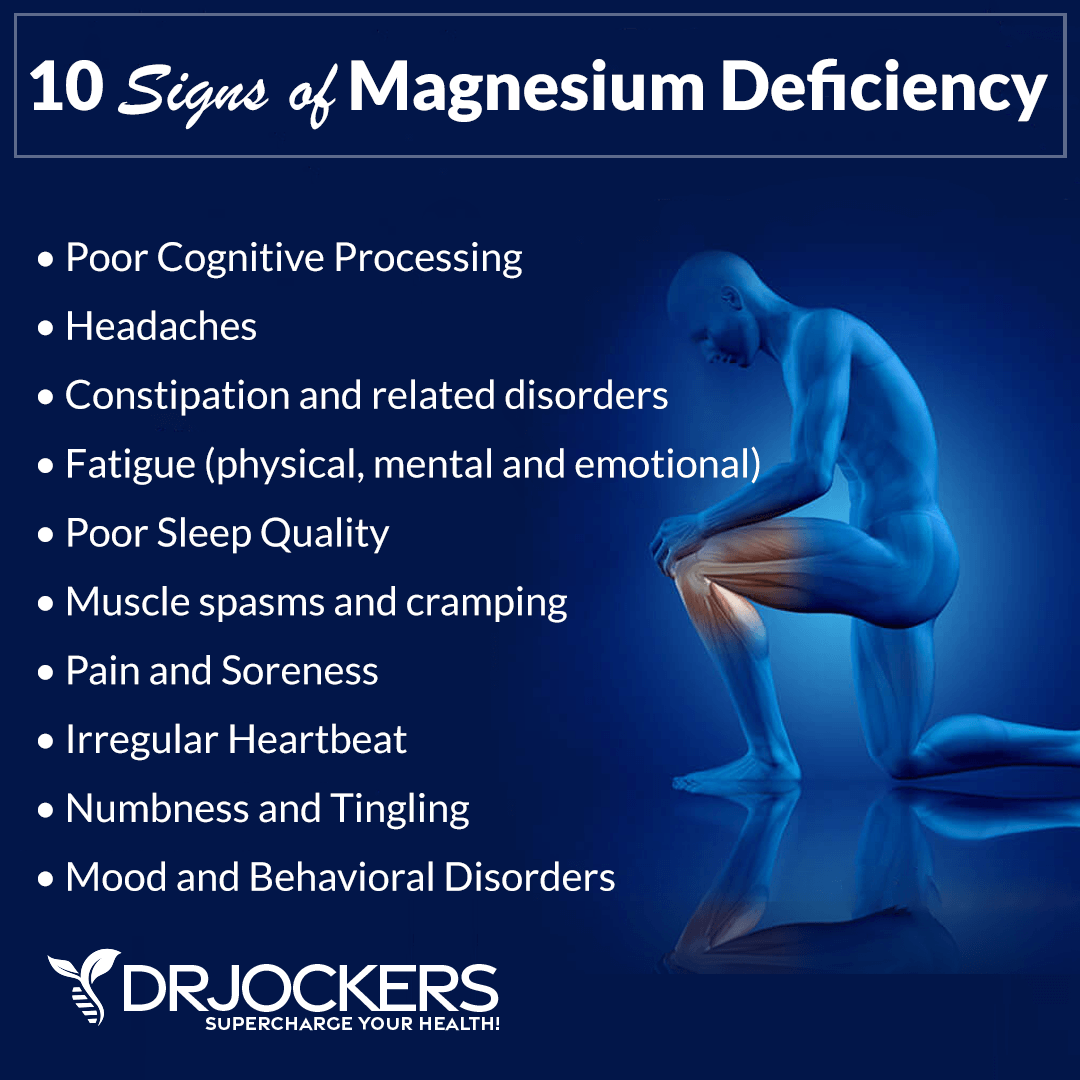
Signs Of Magnesium Deficiency
According to American neurosurgeon Norman Shealy, MD, PhD, almost every known disease is associated with a magnesium deficiency. Because magnesium plays so many roles in the body, symptoms of deficiency can be diverse.
The common thing I notice with magnesium-deficient patients is that they report higher levels of stress and anxiety along with an inability to fall asleep at night. On top of that, there is usually impaired mental function with memory and brain fog.
Other Common Symptoms of Magnesium Deficiency Are:
- Chronic Headaches/Migraines
- Constipation
- IBS
- Muscle Spasms
- Cramping
- Heart Arrhythmias
- Mood Disorders
- ADD/ADHD symptoms
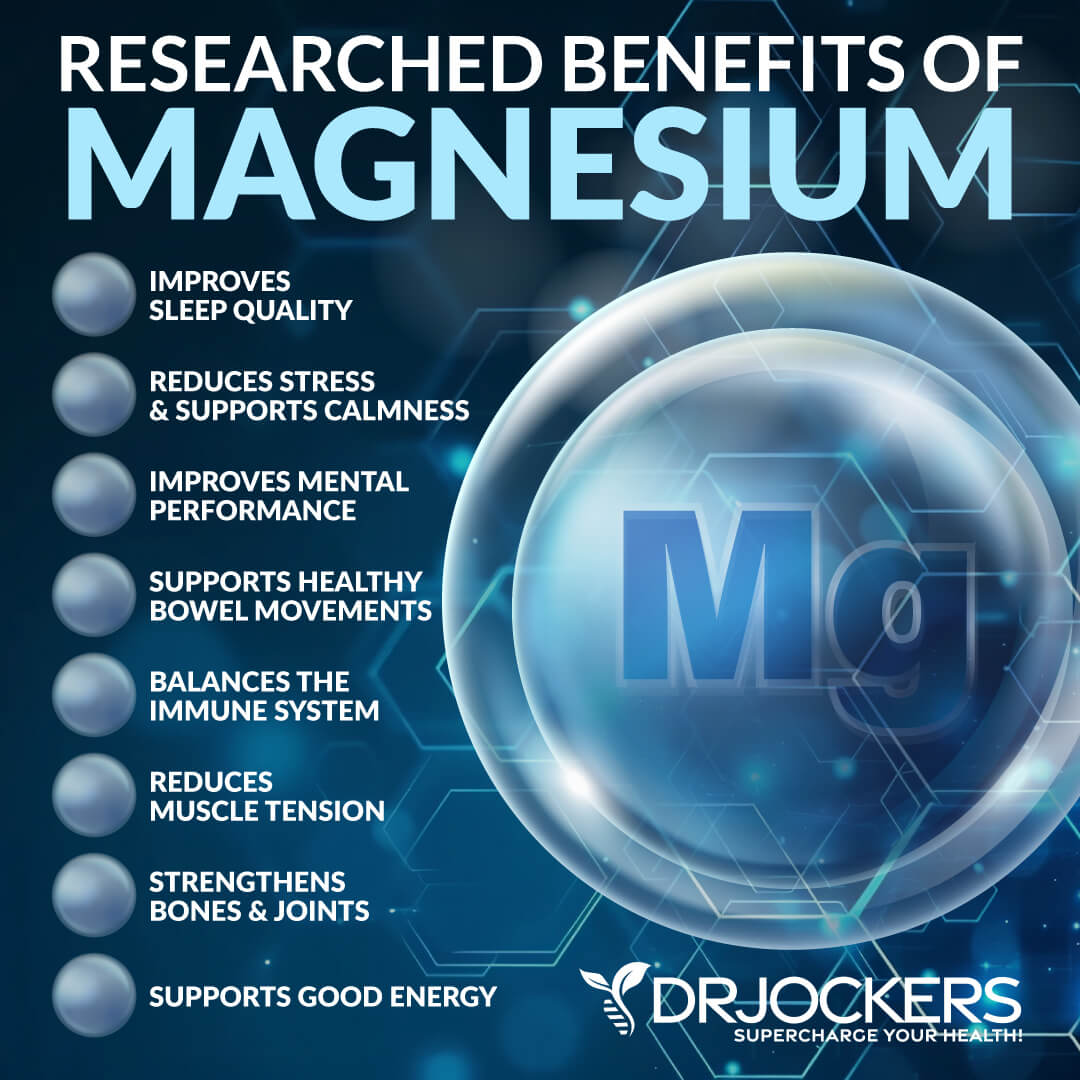
Improves Sleep Quality
Glutamate is converted with the help of Vitamin B6 and magnesium into the inhibitory neurotransmitter GABA. GABA is a chemical in the brain that is responsible for putting on mental breaks and helping you relax. Having a healthy production of GABA is critical for getting a good night’s sleep.
Although you need adequate amounts of amino acids and vitamin B6 as well, I often find that magnesium makes the biggest difference in helping people overcome their insomnia or improve sleep in general. This is arguably the most important of all the magnesium benefits.
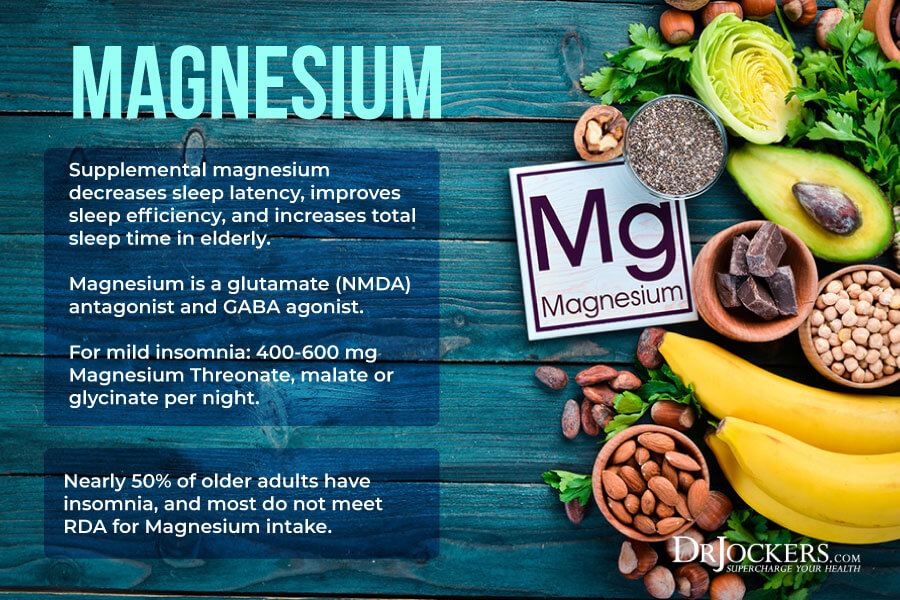
Reduces Stress
In relation to the same mechanism I talked about above, magnesium helps you to relax. If you do not have adequate magnesium, you can accumulate excess glutamate in the brain. Glutamate is important for activities that require high energy and intense focus. In excess, glutamate can push you into chronic stress.
By supplying your body with adequate magnesium, you support your body’s ability to convert excess glutamate into GABA to restore your sense of calm. This way you can better balance a hard-charging lifestyle with relaxation.
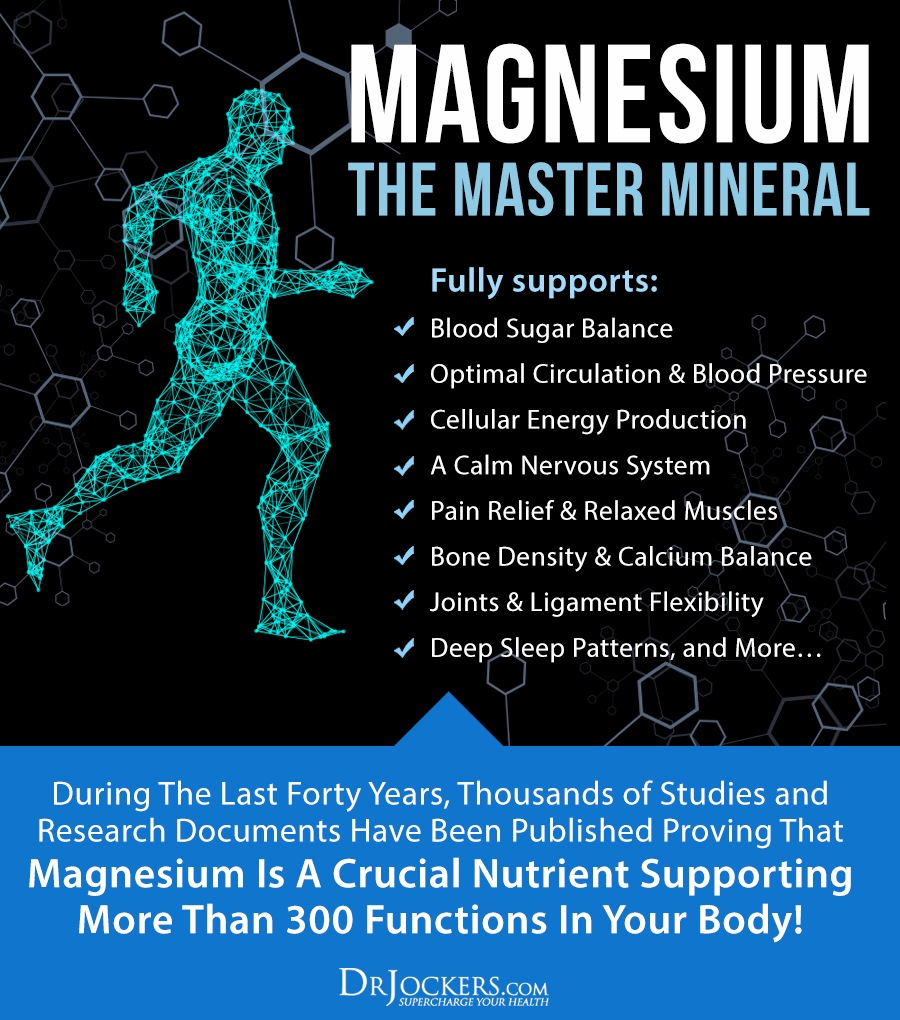
Improves Mental Performance
Brain fog can be a telltale sign of magnesium deficiency. Efficient brain function relies on the proper transmission of signals between junctions called synapses. Magnesium improves mental performance by strengthening these synapses.
Consequently, it has been found that magnesium improves memory and learning while also offering protective effects from neurological disorders such as Alzheimer’s (1, 2).
At the same time, magnesium improves mitochondrial output of ATP which is how your body makes energy. The brain consumes the highest amount of ATP than any other organ in the body so this is important!
Relieves Constipation
One of the major causes of constipation is poor hydration and mineral imbalance. Magnesium supplementation along with adequate hydration loosens the stools while also relaxing the muscles of the GI tract.
For my patients who have constipation, I recommend 1-4 grams of magnesium threonate in water consumed all at once. Start with 1 or 2 grams and if you do not have a significant bowel movement within an hour or so, you can consume more until you do so.
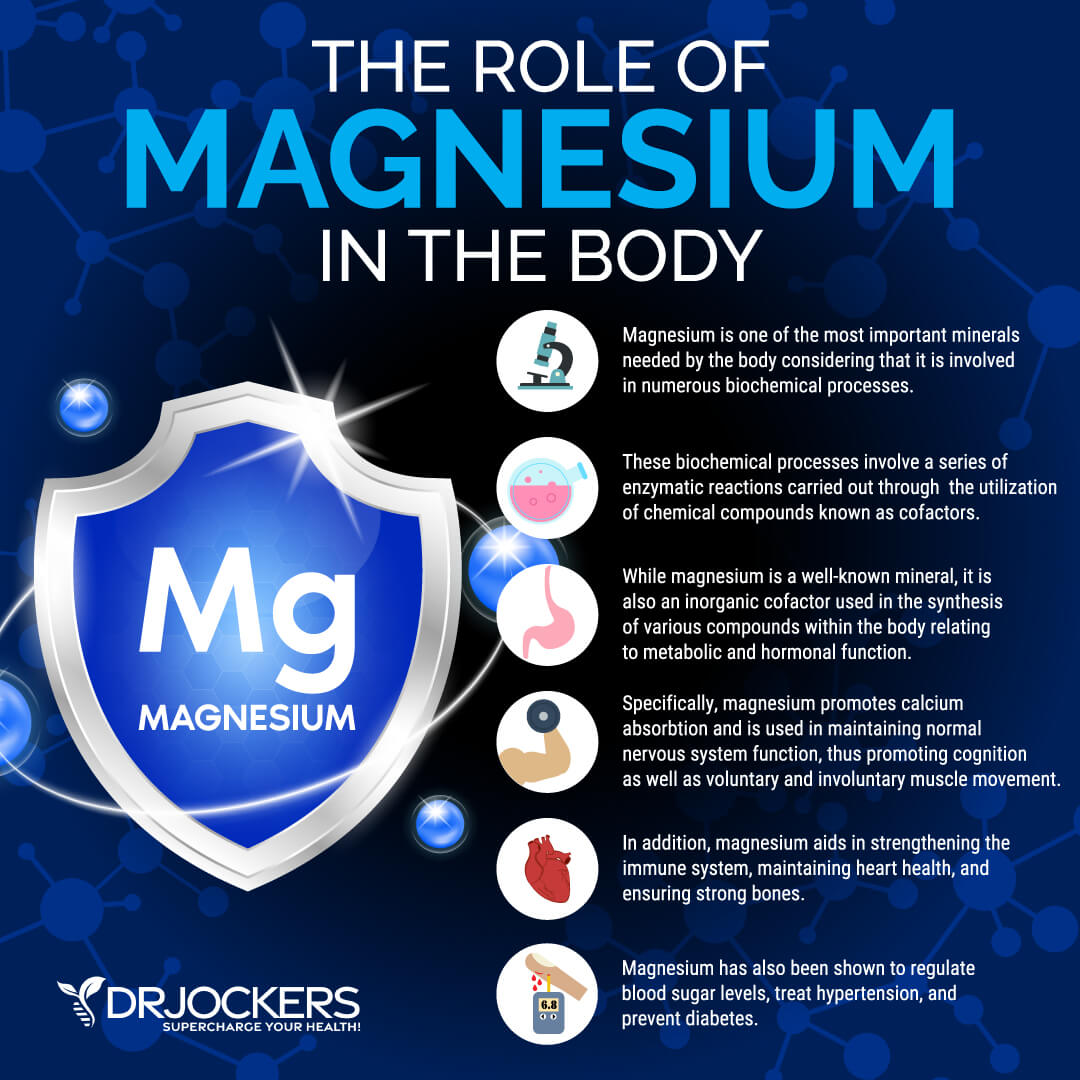
Improves The Immune System
Ion channels within the cells have been targeted as playing a powerful role in immunity. This is because ion channels in cells are critical for communicating information from cell to cell and throughout the body. The immune system relies on efficient communication of information so that the body can be adaptive to any pathogenic threat that may present itself.
Magnesium, along with calcium and zinc, has been isolated as an important cell ion channel mediator with a significant role in immunity (3). If you are lacking adequate magnesium, your immune system may be operating at a subpar level.
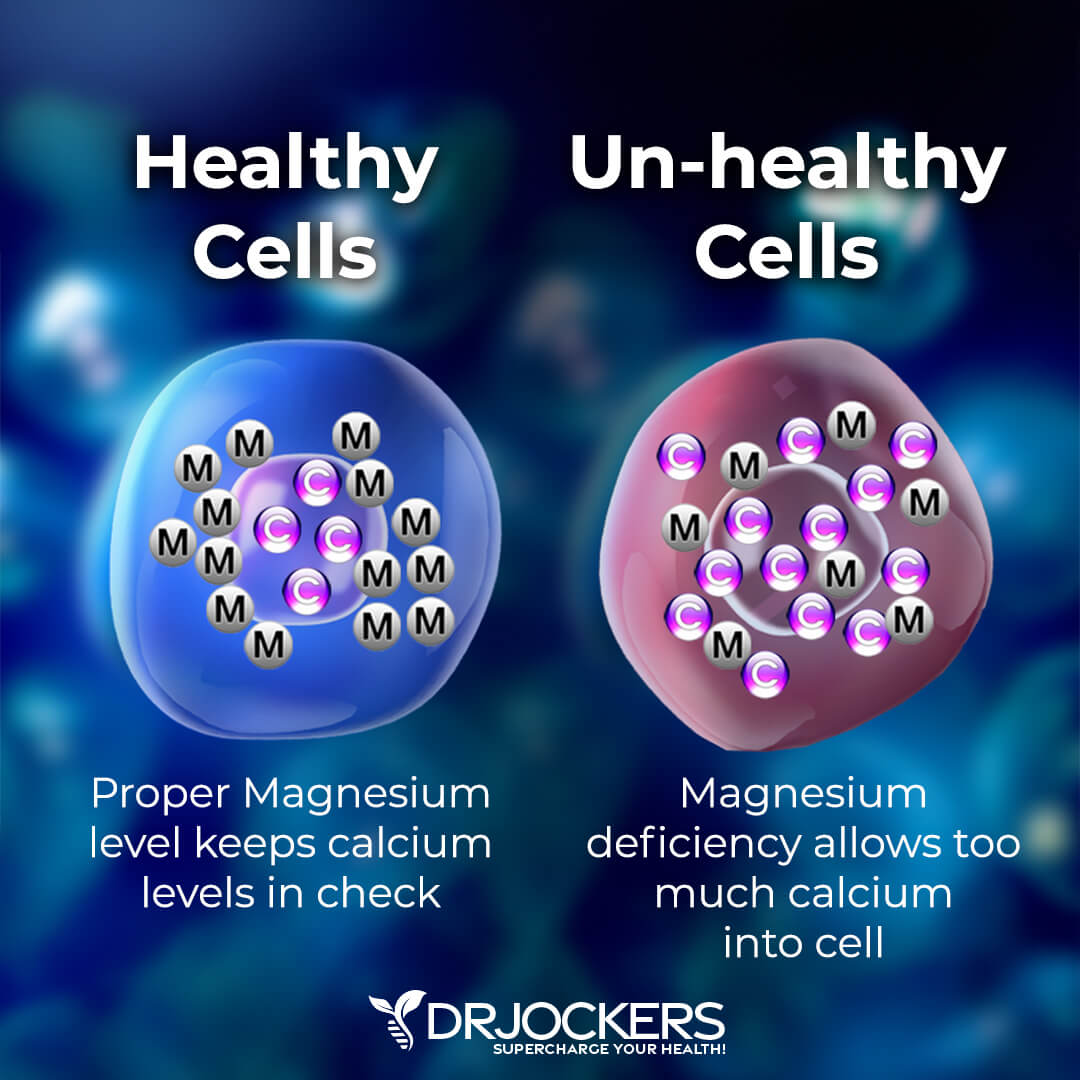
Reduces Muscle Tension
As I talked about in the sections about sleep and stress, magnesium benefits the body by improving nervous system relaxation through the production of GABA. During magnesium deficiency, the nervous system can become hyper-excitable and contribute to tension in the muscles.
Additionally, if you are taking in high amounts of calcium without adequate magnesium, muscles can begin to contract involuntarily. Cases of hypercalcemia can also contribute to significant changes in heart rhythms. Magnesium helps to balance out calcium levels to coordinate muscle contractions and reduce unwanted tension.
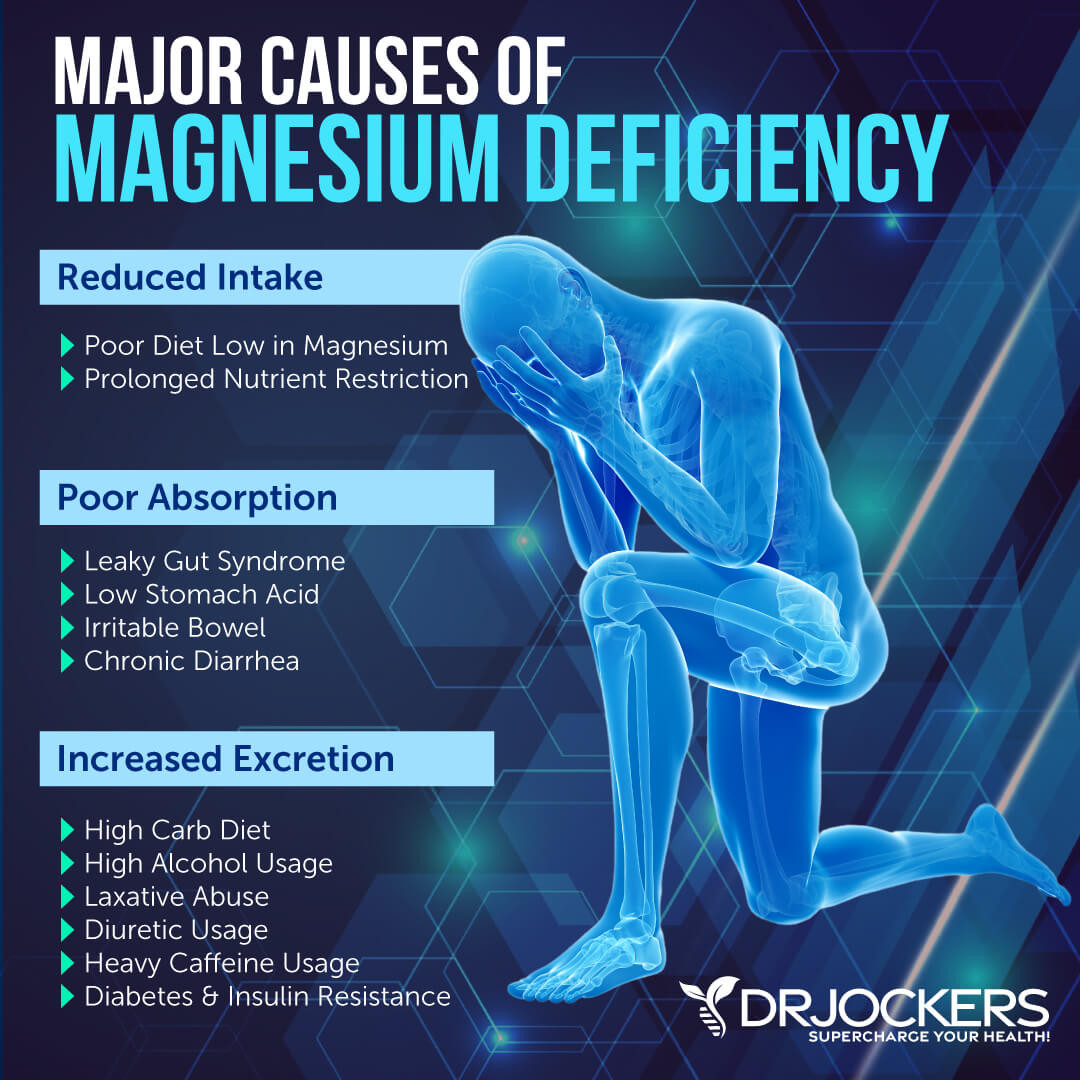
Strengthens Bones & Joints
When your body isn’t receiving adequate magnesium to perform daily functions, it begins to draw on its reserves in the bone. Over time this can contribute to bone loss and achy joints.
Magnesium has also been shown to help regulate vitamin D levels, which is an important regulator of bone formation in the body. Consequently, adequate magnesium intake has been shown to be associated with improvements in bone density (4). This is one of the important magnesium benefits for those at risk of osteoporosis.
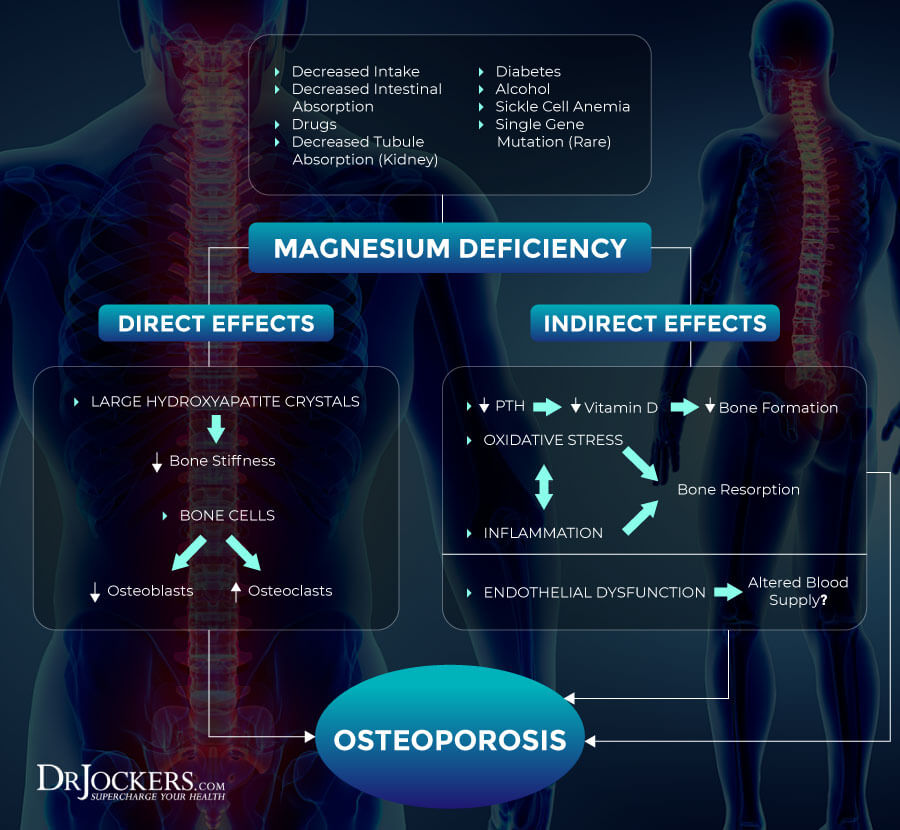
Relieves Pain & Headaches
Magnesium supplementation has been shown to reduce the intensity and frequency of migraine headaches. This may be due to its ability to help regulate neurotransmitters and prevent vasoconstriction of blood vessels in the brain.
On top of all this, magnesium is crucial for regulating electrolyte balance. Electrolytes are needed for proper nerve conduction which is how the brain transmits signals within itself and throughout the body. Optimizing nerve transmission within the brain is likely another reason magnesium can relieve pain and headaches.

Relieves Anxiety
The prevalence of individuals who claim to feel anxiety daily has grown significantly over recent years. Anxiety typically manifests due to the perception of unmanageable stress. This can sometimes be due to chemical imbalances in the brain, such as the balance between glutamate and GABA that I have mentioned.
This is why I refer to magnesium as a powerful adaptogenic agent (a substance that helps you adapt to stress). Chronic stress can influence glutamate-GABA balance and lead to the development of anxiety over time. Seeing an improvement in resilience to stress and anxiety reduction is one of the common magnesium benefits I see in people.
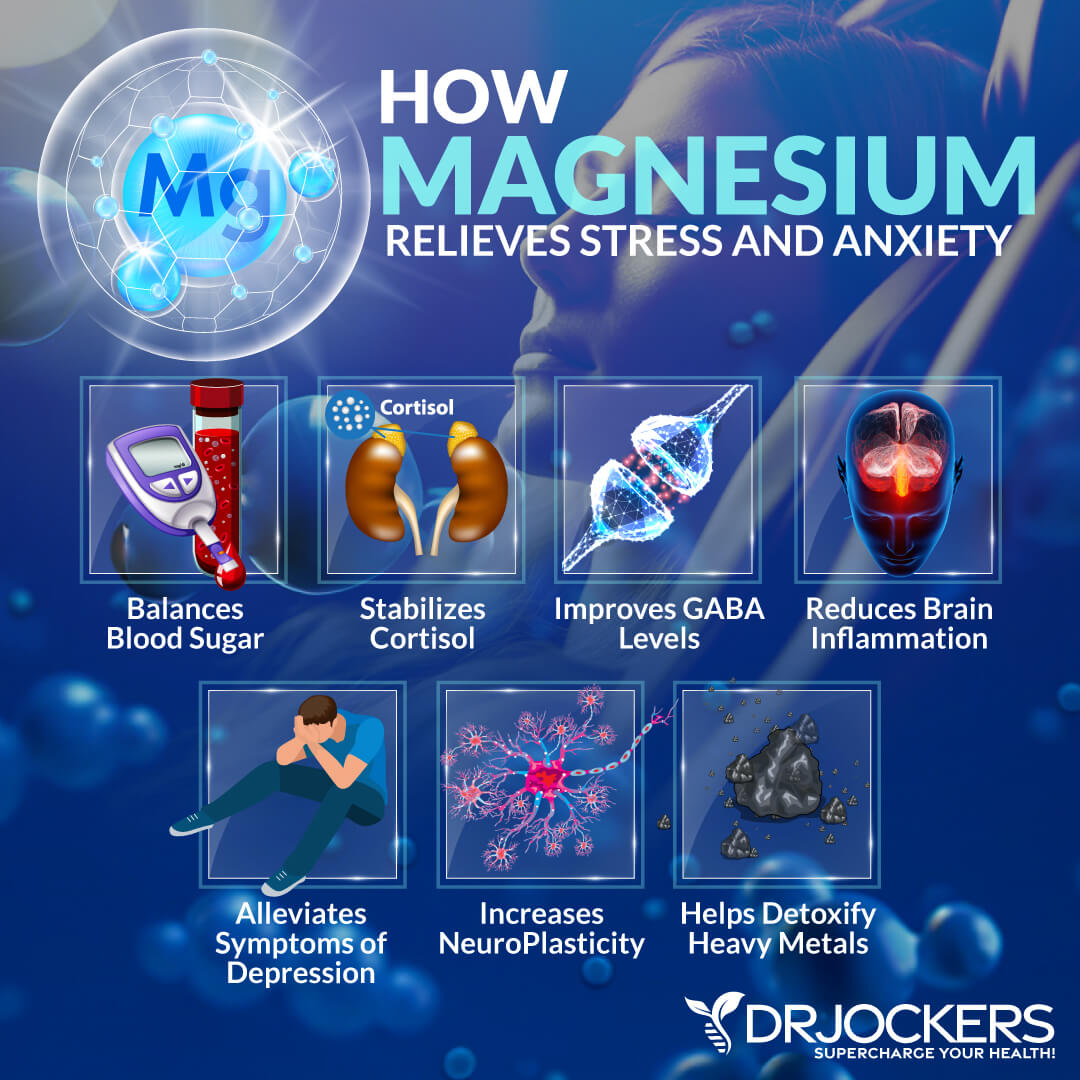
Increases Energy
ATP, as I mentioned in the mental performance section of this article, is the energy molecule for every cell in your body. Optimizing the production of this important molecule has an incredible impact on your overall well-being.
Mitochondria are structures within your cells that produce ATP and they require magnesium to do so (5). At the same time, because magnesium is needed for so many processes in the body, topping off your magnesium stores just helps everything function a little smoother.
A deficiency can quickly build up stress within the body and drain your ATP, making you feel chronically fatigued. Energy improvements are one of the most common magnesium benefits my clients report to me.
3 Ways To Support Magnesium Levels
Now that you know the deficiency signs and health benefits of magnesium, here are some great ways to incorporate this vital mineral into your daily life. You will also want to take steps to control blood sugar and reduce stress as these are two of the most common things that drain your magnesium stores.
Magnesium Rich Foods
When it comes to getting nutrients into your body, food should always be the first strategy. Foods that are high in magnesium are dark leafy greens, avocados, pumpkin seeds, sea vegetables, wild-caught fish, grass-fed butter, and sprouts.
Epsom Salt Baths
Epsom salts are made of magnesium sulfate. Soaking in an Epsom salt bath is an easy and relaxing way to get magnesium into the body. This method is especially helpful for people with digestive disorders as it bypasses the GI tract altogether by absorbing through the skin.
While traditional Epsom salts are made of magnesium sulfate, there are also newer forms of magnesium flakes that are made of magnesium chloride. Both types of salts provide benefits for the body, however, magnesium chloride may be able to provide longer-lasting benefits. This is because magnesium chloride is both easier to absorb and slower to be excreted from the body.
This means that less magnesium chloride is needed to derive benefits. One of my favorite brands of magnesium flakes is Ancient Minerals and their bath soak can be found here.
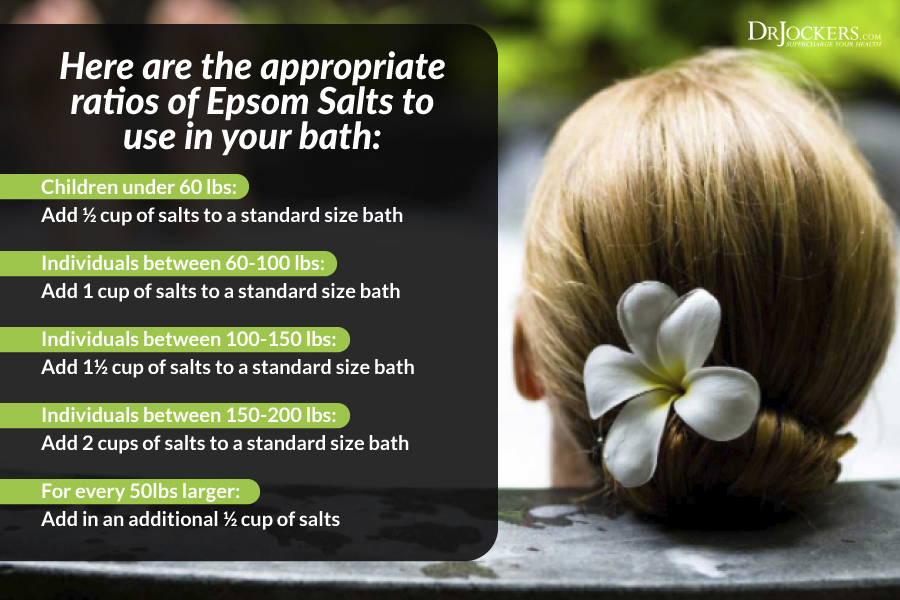
3. Supplemental Magnesium
When it comes down to it, our food supply just isn’t what it used to be. Industrialization and poor attention to soil quality have depleted our soil of vital nutrients that used to be passed into the food we ate.
Although we are starting to wake up to this fact and make more conscious efforts to create nourished farming conditions, our food is still lacking in the nutrition our bodies need.
This is why I recommend supplemental magnesium to so many of my patients. It is just so critically important to make sure you get enough magnesium in your diet that even I supplement with it every day.
Not all magnesium is made equal. Different forms of magnesium have different benefits, some are better for mental health or sleep, and others may have digestive benefits. Some are not bioavailable to your body and are effective in most cases.
I’ve discussed the benefits of different forms of magnesium in this article. Here are the best forms of magnesium for your brain, mental health, and depression.
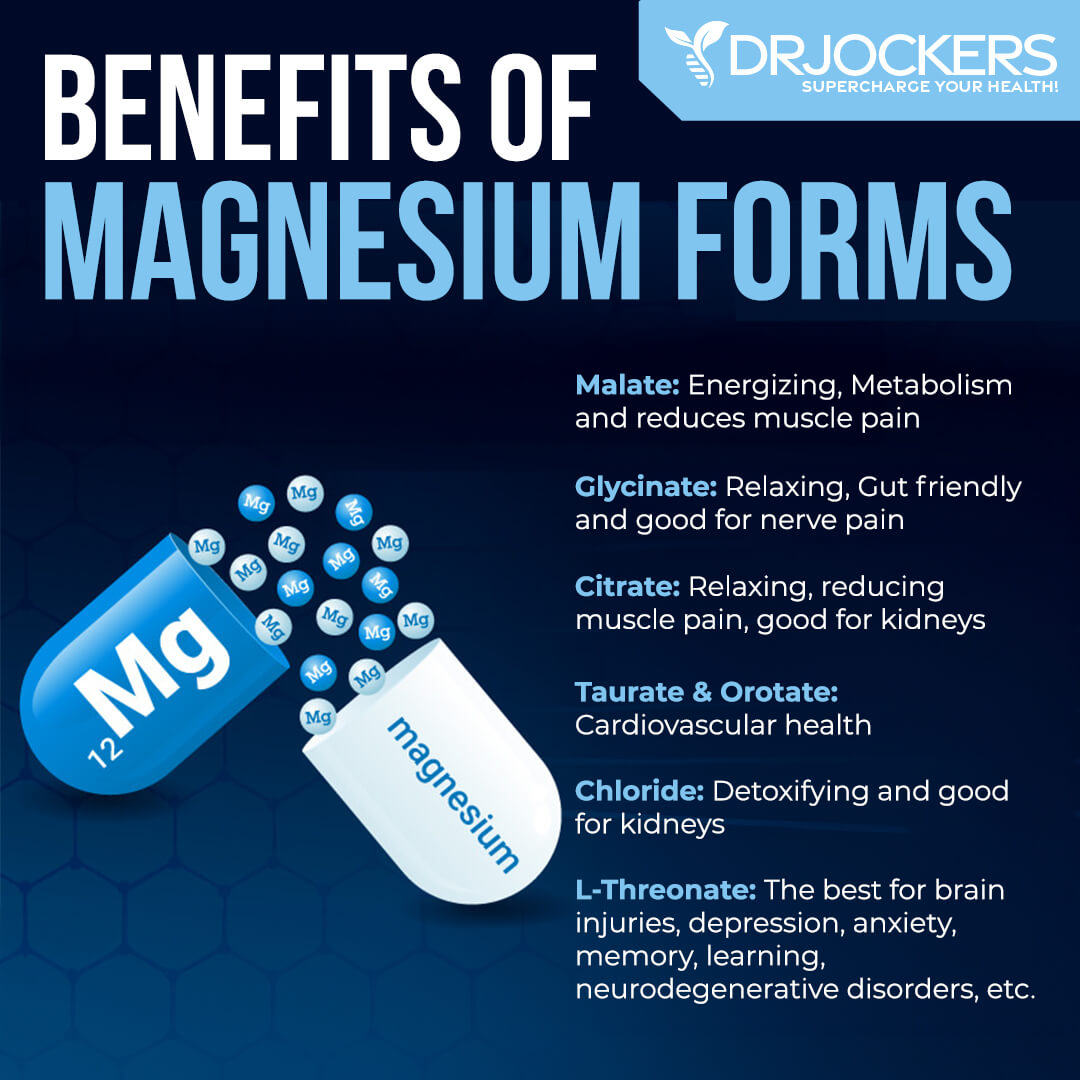
Magnesium Malate
Magnesium malate is a form of magnesium bonded to malic acid. Magnesium malate naturally occurs in many foods, especially in fruits. Malic acid is a key component of the Krebs Cycle, which is the biological process responsible for making ATP energy.
Thus, magnesium malate is a great option for improving energy-related disorders, including depression and chronic fatigue syndrome. According to a 2011 study published in Orvosi Hetilap, magnesium malate may help to support a healthy magnesium-calcium balance (6).
Magnesium Glycinate
Magnesium glycinate or chelated magnesium is made up of magnesium and amino acid glycine. According to a 2017 review published in Nutrients, magnesium glycinate is one of the most bioavailable forms of magnesium (7).
Magnesium is a gut-friendly magnesium that’s also great for digestive issues It is the most commonly recommended option for hypomagnesemia or clinically diagnosed magnesium deficiency.
Magnesium L-Threonate
Magnesium L-threonate (MgT) is a newer form of magnesium that’s commonly used for brain and mental health including depression, anxiety, brain fog, cognitive performance, learning, and memory. According to a 2014 study published in Molecular Brain, magnesium threonate may offer neuroprotective and cognitive-boosting benefits that may be protective against Alzheimer’s disease (8).
A 2011 study published in the Journal of Neurosciences has found that magnesium L-threonate may help to support NMDA receptors (NMDARs) signaling, BDNF expression, and synaptic plasticity (9). A 2019 comparative study published in the Pakistani Journal of Pharmaceutical Sciences has found that magnesium L-threonate supplementation may help to improve oxidative stress and neurobehavioral activities (10).
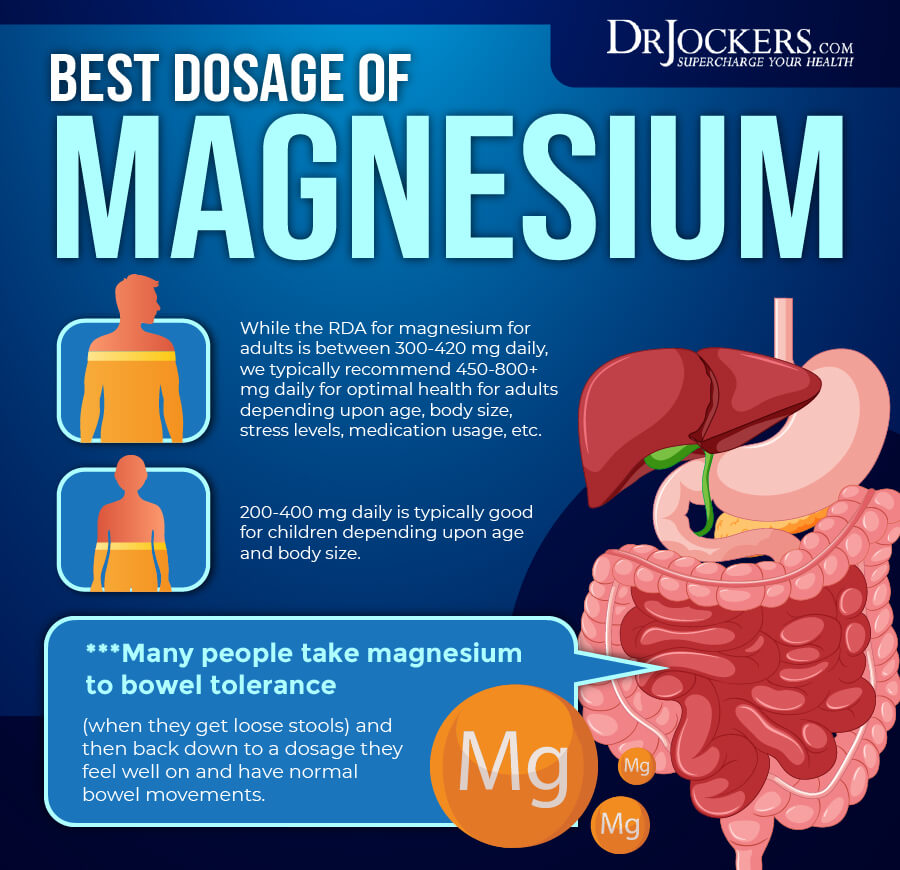
Transdermal Magnesium
Transdermal magnesium comes in a lotion that can be applied to the abdomen or areas of pain for quick absorption that bypasses the digestive tract.
This is important, especially in cases where the digestive tract is damaged or compromised and cannot absorb magnesium properly (such as a leaky gut). The Ancient Minerals Magnesium with MSM product is a great transdermal lotion that works quickly and effectively. It contains magnesium as well as MSM which helps reduce pain and inflammation and this is a great product to use on sore and painful joints and muscles.
I also like the Ancient Minerals Goodnight lotion which contains transdermal magnesium with melatonin. This is a fantastic product to put on the soles of your feet and on your upper arms before bed to enhance sleep quality.
Introducing Brain Calm Magnesium
I recommend Brain Calm Magnesium. We developed Brain Calm Magnesium to provide the best form of magnesium to improve brain function and neuronal health. This product helps you to focus, concentrate, and perform at a significantly higher level. In addition, it is fantastic for reducing anxiety while improving mood, memory, and sleep.
Brain Calm Magnesium features key Albion forms of Magnesium (malate, lysinate & glycinate chelate) as well as magnesium L-threonate the only form of magnesium proven in animal studies to cross the blood-brain barrier. Boosting the brain’s magnesium level is vital to healthy cognition, which includes long- and short-term memory, learning, stress management, and sleep.
Because many forms of magnesium have low bioavailability, we carefully selected magnesium compounds backed by research and studies to formulate Brain Calm Magnesium. This product features a unique combination of highly absorbable, organic Albion minerals—di-magnesium malate and magnesium lysinate glycinate chelate—and Magtein.
Magtein is a groundbreaking organic magnesium compound that was developed by MIT (Massachusetts Institute of Technology) researchers to support “brain power.”
Magtein is the result of 10 years of research at MIT. This novel form of magnesium is changing the way we support brain health. Unlike other brain products on the market that work via brain stimulation (often overstimulation), Magtein works via a completely different mechanism.
When brain magnesium levels are not optimal, synapse function deteriorates. By delivering magnesium into synapses, Magtein helps brain cells stay healthy without being overactivated; consequently, brain cells respond to signals with clarity and robustness.
Brain Calm Magnesium supports healthy brain magnesium levels, healthy synapse number, and function, supports memory and cognitive acceleration, supports stress management, helps sleep quality, supports healthy mood, and ensures optimal magnesium intake.
I use Brain Calm Magnesium daily during the daytime to improve my concentration and productivity. I also take some at night and have noticed much deeper and more restorative sleeping patterns. I use this product with clients who are struggling with neurodegenerative issues, mental clarity, sleep, and mood issues.
 Final Thoughts
Final Thoughts
By now you understand how important magnesium is for the human body. Even if you do not have any of the common symptoms of magnesium deficiency listed above, just about anyone can benefit from additional magnesium in the diet.
I use magnesium every day as I find that it helps keep my mind at ease and my energy levels balanced. It also has the cool effect of acting as an adaptogen by improving your body’s ability to adapt to everyday stressors. It truly is a modern-day health tonic!
If you want to work with a functional health coach, I recommend this article with tips on how to find a great coach. Our website offers long-distance functional health coaching programs. For further support with your health goals, just reach out and our fantastic coaches are here to support your journey.







Will this help with hypercalcemia?
Yes Evelyn it will help balance your calcium to magnesium ratio!
How will this magnesium help with victims of cancer both lung and brain cancers? would appreciate any information or sites you have that could help us understand the potential or possible benefits of the magnesium and or minerals that help
Hey Betty, I wouldn’t consider magnesium to be specifically an anti-cancer agent but it would absolutely support the body in a time of increased stress. It also helps immune your immune system which can aid in cancer healing. Having enough minerals in general will help by improving the coordination of the nervous system which is always important no matter what the issue. You may find these articles useful!
https://drjockers.com/the-diet-that-destroys-cancer/
https://drjockers.com/top-24-cancer-fighting-foods/
https://drjockers.com/top-12-cancer-stem-cell-killing-nutrients/
https://drjockers.com/top-10-natural-cancer-treatments/
Hello Dr Jockers, my question does mag help for nerve damage caused by a nurse trying to insert
a needle to give me IV in my right arm..since then my arm has been numb and pins & needles went to see doctor prescribed meds it just gets me sleepy..then morphine..I want a healthy solution.
Pls help..thanks🙏💕
Sorry to hear that Anna! Yes it can help! The best supplement for improving nerve damage is Alpha Lipoic Acid in high doses. I would recommend taking our ALA Power 2 caps – 2x daily https://store.drjockers.com/products/ala-power-cr?_pos=1&_sid=c7081fde9&_ss=r
Anything for ALS you would recommend?
Yes here is a helpful article: https://drjockers.com/als/
Hello Dr Jockers
I have been told that Coconut oil causes endotoxema. Is this true
Hello Leslie,
Yes, the long chain saturated fats can contribute to endotoxemia if you have leaky gut and dysbiosis. Always best to combine the coconut oil with polyphenols such as turmeric, berries, green tea, coffee, etc. which will help to stop the endotoxemia. Also, fiber can be helpful here as well!
My wife is in chronic pain all the time comes and goes, but most of time all the time , her nephrologist has her doing 500 mg twice a day, but after reading what you have to say it’s not enough, what do u suggest, she has mutable symptoms ,diabetes, fibromyalgia, sugar levels won’t come down she sleeps during the day and urinates frequently,what do u think u can do for here, and thanks for your great articles
Very sorry to hear about that! Here is a helpful article: https://drjockers.com/fibromyalgia/